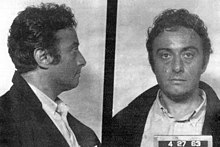kitalálod-e,
melyik az a fontos szó? a fordításhoz pedig nem árt haladónak
lenned – és mindenképpen használd fel a dőlt betűs segítséget.
Segítség a nyelvtanhoz:
* felszólítás (videó)
* felszólítás_mondatok
* általános alany_mondatok
* to + főnévi igenév_mondatok
Wikipedia:
Leonard Alfred Schneider (October 13, 1925 – August 3, 1966),
better known by his stage name Lenny Bruce, was an American stand-up
comedian, social critic, satirist, and screenwriter. He was renowned
for his open, free-style and critical form of comedy which integrated
satire, politics, religion, sex, and vulgarity. His 1964 conviction
in an obscenitytrial was followed by a posthumous pardon, the first
in New York State history, by then-Governor George Pataki in 2003. He
paved the way for future outspoken counterculture-era comedians, and
his trial for obscenity is seen as a landmark for freedom of speech
in the United States...
...On
October 4, 1961, Bruce was arrested for obscenity at the Jazz
Workshop in San Francisco; he had used the wordcocksucker and riffed
that "to is a preposition, come is a verb", that the sexual
context of come is so common that it bears no weight, and that if
someone hearing it becomes upset, he "probably can't come".
Although the jury acquitted him, other law enforcement agencies began
monitoring his appearances, resulting in frequent arrests under
charges of obscenity...
...Bruce
was arrested again in 1961... ...The specification this time was that
the comedian had used the word schmuck, an insulting Yiddish term
that is an obscene term for penis...
...On
December 5, 1962, Bruce was arrested at the legendary Gate of Horn
folk club in Chicago...
...In
April 1964, he appeared twice at the Cafe Au Go Go in Greenwich
Village with undercover police detectives in the audience. He was
arrested along with the club owners, Howard and Elly Solomon, who
were arrested for allowing an obscene performance to take place. On
both occasions, he was arrested after leaving the stage, the
complaints again pertaining to his use of various obscenities...
...On
December 23, 2003, 37 years after his death, New York Governor George
Pataki granted Bruce a posthumous pardon for his obscenity
conviction.



